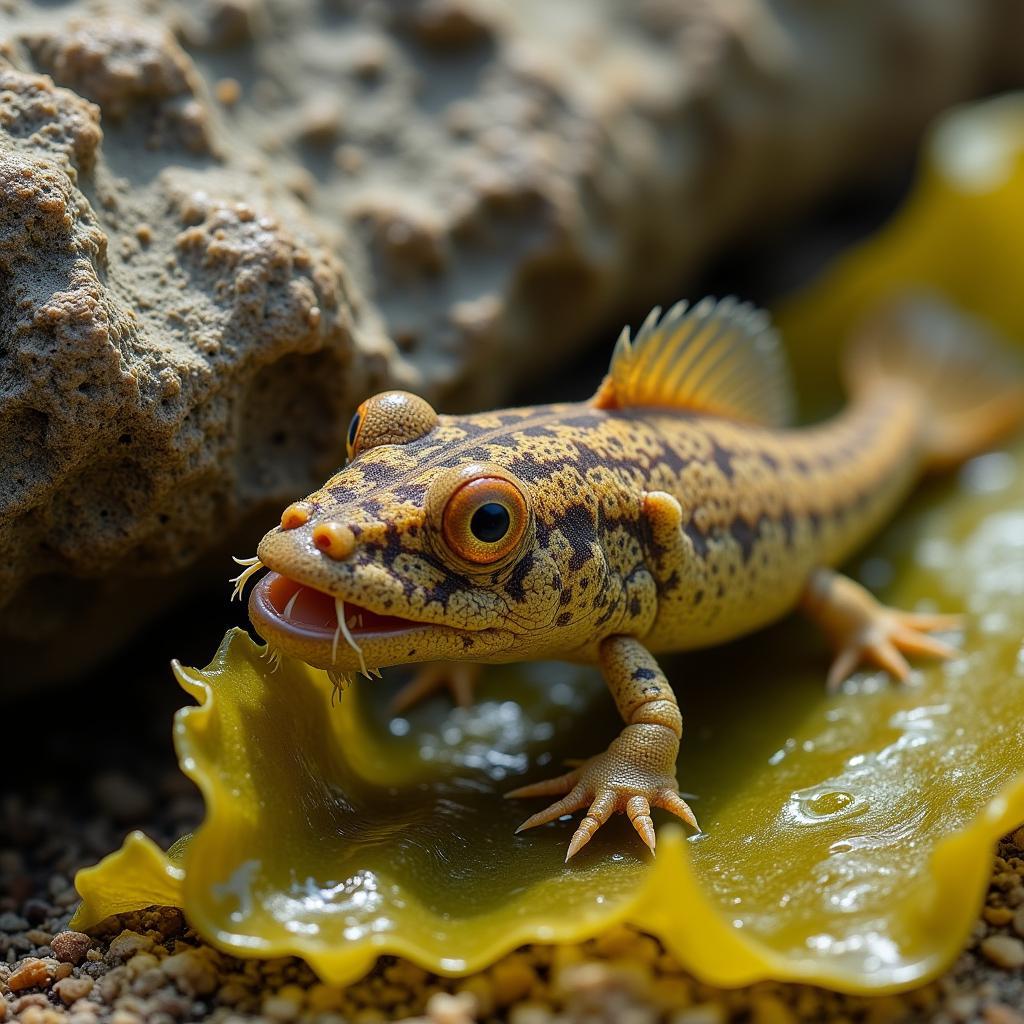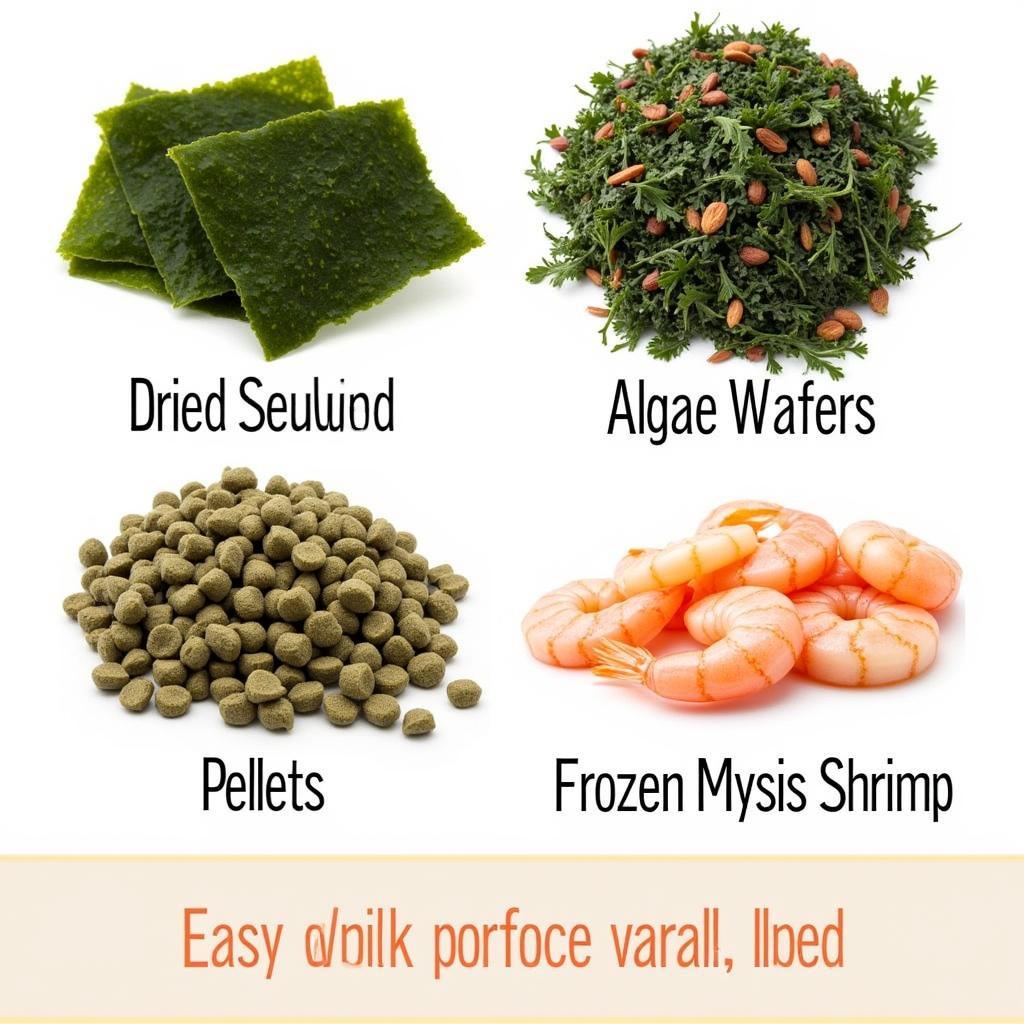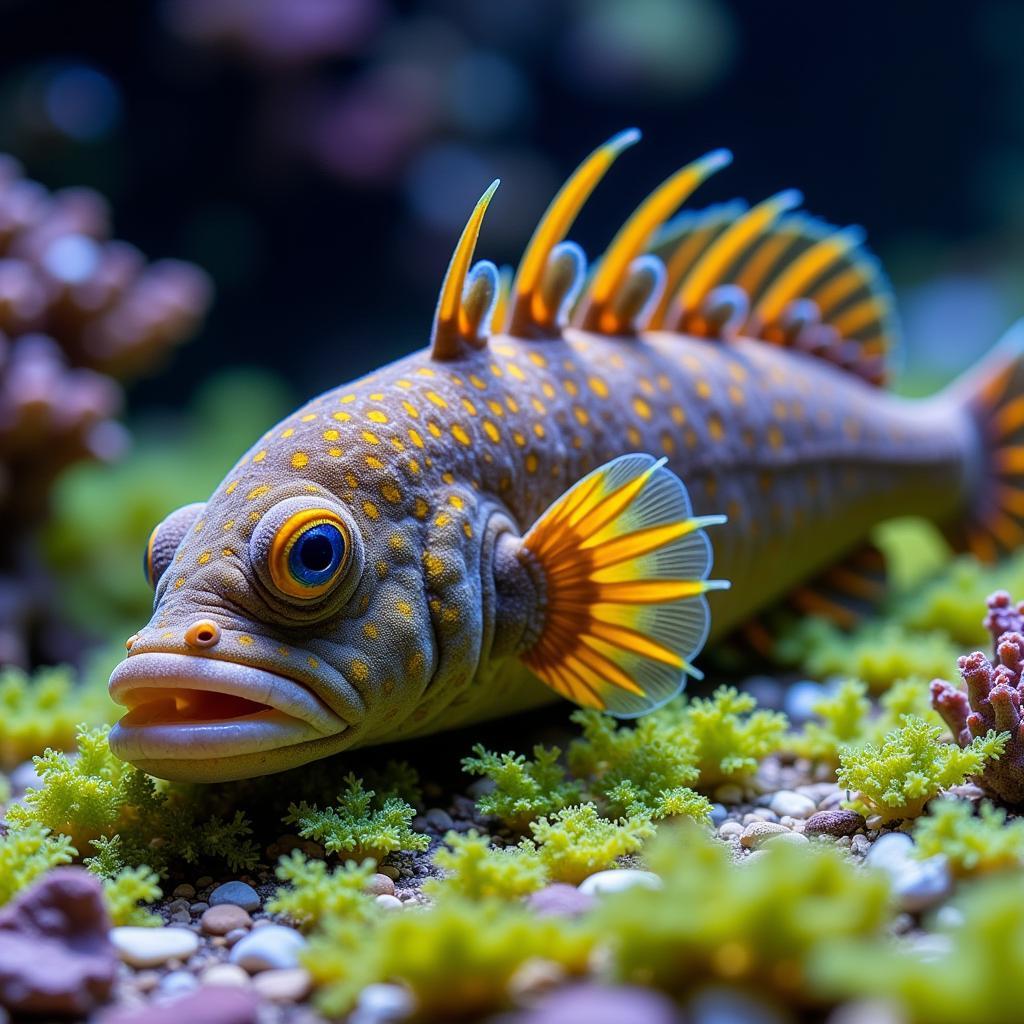Keeping a lawnmower blenny thriving in your reef tank hinges on providing the right food. This guide dives deep into the dietary needs of these fascinating algae grazers, ensuring you have everything you need to keep your lawnmower blenny happy and healthy. We’ll cover everything from their natural diet to commercially available options, and even offer tips on supplementing their food for optimal health.
Understanding the Lawnmower Blenny’s Natural Diet
In their natural habitat, lawnmower blennies (Salarias fasciatus) are primarily herbivores, constantly grazing on algae. This constant grazing keeps algae growth in check, making them a valuable addition to any reef tank. Their diet primarily consists of various types of film algae, hair algae, and diatoms that grow on rocks and other surfaces within the reef. This natural grazing behavior not only provides them with sustenance but also plays a vital role in maintaining the balance of the reef ecosystem.
What to Feed Your Lawnmower Blenny in a Home Aquarium
While a healthy growth of algae in your tank will provide some sustenance for your blenny, it’s rarely enough to meet their full nutritional needs, especially in a well-maintained aquarium. Therefore, supplementing their diet is crucial. Here are some excellent food choices:
-
Dried Seaweed Sheets: These are a staple food for herbivorous fish and are readily accepted by most lawnmower blennies. Look for varieties made from nori, spirulina, or other types of seaweed. You can attach these sheets to a clip or rock to encourage natural grazing behavior.
-
Algae Wafers: Algae wafers are another excellent option, providing a concentrated source of nutrients. Choose wafers specifically designed for herbivorous fish, ensuring they contain a blend of algae and other beneficial ingredients.
-
Frozen Foods: While not their primary food source, offering occasional frozen foods like mysis shrimp or brine shrimp can provide variety and additional nutrients. However, these should be given sparingly as part of a balanced diet.
-
Pellets Designed for Herbivores: High-quality pellets specifically formulated for herbivorous fish can be a valuable addition to their diet. These pellets often contain a balanced mix of algae, vitamins, and minerals.
 Lawnmower Blenny Eating Algae Sheet
Lawnmower Blenny Eating Algae Sheet
Ensuring a Balanced Diet for Optimal Health
Beyond the core food options, it’s important to consider ways to further enhance your lawnmower blenny’s diet. Adding a variety of foods ensures they receive a full spectrum of nutrients.
-
Variety is Key: Just like humans, fish benefit from a diverse diet. Rotating between different types of seaweed sheets, algae wafers, and pellets can prevent nutritional deficiencies and keep your blenny interested in its food.
-
Supplements: Consider adding liquid vitamin supplements specifically designed for marine fish. These supplements can be added to the water or soaked into food, providing additional vitamins and minerals that may be lacking in their regular diet.
-
Live Algae: If possible, introducing live algae cultures into your tank can further mimic their natural diet. This not only provides a nutritious food source but also helps to maintain the overall health of your reef ecosystem.
 Various Foods for Lawnmower Blenny
Various Foods for Lawnmower Blenny
How Often Should You Feed a Lawnmower Blenny?
Lawnmower blennies are constant grazers, so it’s best to provide them with food multiple times a day. Offering small amounts of food several times throughout the day is preferable to one large feeding. This mimics their natural grazing behavior and helps prevent overfeeding, which can lead to water quality issues.
What if My Lawnmower Blenny Won’t Eat?
If your lawnmower blenny refuses to eat, it’s essential to investigate the cause. Check water parameters to ensure they are within acceptable ranges. Also, observe the blenny for any signs of illness or stress. Try offering different types of food to see if there’s a particular preference. If the problem persists, consult a veterinarian specializing in aquatic animals.
“A healthy, thriving lawnmower blenny is a sign of a well-maintained reef tank,” says Dr. Rebecca Jones, a marine biologist specializing in reef ecosystems. “Providing them with a balanced diet that mimics their natural feeding habits is key to their overall well-being.”
 Healthy Lawnmower Blenny in Reef Tank
Healthy Lawnmower Blenny in Reef Tank
Conclusion
Providing the right food for your lawnmower blenny is essential for their health and longevity. By following the guidelines in this comprehensive guide, you can ensure your blenny receives the necessary nutrients to thrive in your home aquarium. A well-fed lawnmower blenny will not only be a healthy and happy addition to your tank but will also play a vital role in controlling algae growth, contributing to a balanced and beautiful reef ecosystem.
FAQ
-
What is the best food for a lawnmower blenny? A variety of dried seaweed sheets, algae wafers, and herbivore pellets.
-
How often should I feed my lawnmower blenny? Several small feedings per day.
-
Can lawnmower blennies eat meaty foods? Occasionally, but their diet should primarily consist of algae-based foods.
-
Why is my lawnmower blenny not eating? Check water parameters, observe for signs of illness, and try different foods.
-
What type of algae do lawnmower blennies eat? Film algae, hair algae, and diatoms.
-
Can I supplement my lawnmower blenny’s diet? Yes, with liquid vitamins designed for marine fish.
-
Are lawnmower blennies good for reef tanks? Yes, they help control algae growth.
Need further assistance? Contact us at Phone: 02437655121, Email: [email protected] Or visit us at: 3PGH+8R9, ĐT70A, thôn Trung, Bắc Từ Liêm, Hà Nội, Việt Nam. We have a 24/7 customer service team.